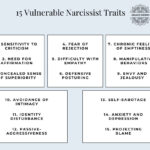Things Covert Narcissists Say: 50 Examples of Covert Narcissism
You would be shocked to hear the things covert narcissists say, I know I was. Their manipulation is often so subtle that it’s difficult to recognize until it’s too late. Covert narcissists are experts at charming, misleading, and subtly controlling their victims, often making you question your own sanity.
They wield words like weapons, all while maintaining a facade of innocence. If you’ve experienced the pain caused by such manipulation, it’s time for a change.
If you’re interested in healing from narcissistic abuse, I warmly welcome you to my Narcissistic Abuse Recovery Program. It’s an easy self-paced online course which you can do at your own pace. My signature program combines scientific and spiritual tools for holistic healing of the body, mind, and spirit.
Things Covert Narcissists say
This list features 15 narcissistic statements often expressed by covert narcissist mothers and partners, revealing their subtle, manipulative tendencies. It serves as a valuable component of a comprehensive narcissist checklist to identify potential narcissistic behavior.
- “I don’t usually like to talk about it, but I’ve been through a lot.”
- “I’m not appreciated enough for what I do.”
- “People always seem to misunderstand me.”
- “I often feel like I’m the only one putting in effort.”
- “I’m usually the smartest person in the room.”
- “I don’t get why people always focus on my small mistakes.”
- “Why am I always the one who ends up getting hurt?”
- “It’s hard being the only one who sees things clearly.”
- “People always take advantage of my kindness.”
- “I never get the recognition I deserve.”
- “I feel like no one truly appreciates my talents.”
- “Why do good things always happen to others and not me?”
- “People don’t realize how hard it is for me.”
- “I’m not bragging, but I’m quite special compared to others.”
- “I feel like I’m always the victim of circumstances.”
Related: 12 Traits of a Narcissist
Things covert narcissists say in an argument
Covert narcissists, unlike their overt counterparts, tend to be more subtle and indirect with their narcissism. They can be passive-aggressive, portray themselves as victims, and use manipulation techniques such as narcissist gaslighting.
As always, remember that context matters, and these narcissistic statements can also be used by individuals who are not necessarily narcissistic:
- “You’re just misunderstanding what I’m saying, as usual.”
- “Why can’t you ever see my point of view?”
- “You’re overreacting. You’re always so sensitive.”
- “I don’t know why you’re making such a big deal out of this.”
- “I was just joking. Can’t you take a joke?”
- “You’re the one who started this, not me.”
- “It’s not my fault you feel that way.”
- “I never said that. You’re remembering it wrong.”
- “You always twist things around to make me look bad.”
- “You’re always so critical of me. It’s exhausting.”
- “I don’t know why you’re always picking fights.”
- “I’m the victim here. You’re just trying to make me look bad.”
- “I can’t believe you’re accusing me of such a thing. You know me better than that.”
- “I’m trying to help you, but you’re not appreciating it.”
- “You always make everything about yourself.”
Related: Do Narcissists Know They Are Narcissists?
Examples of covert narcissism
Let’s explore the following 10 covert narcissist examples and behaviors which are all narcissist red flags.
These phrases alone do not conclusively label someone as a covert narcissist. It’s the consistent pattern of such behaviors and statements that could point towards narcissism. Nonetheless, understanding these phrases can be beneficial in learning how to deal with a narcissist.
- Passive-aggressive communication: A covert narcissist might express their displeasure or hostility in an indirect manner, such as giving the silent treatment, making snide comments, or subtly sabotaging others.
- Playing the victim: Covert narcissists often portray themselves as victims in various situations to gain sympathy or to manipulate others.
- Subtle put-downs: They may use subtle insults or criticisms to undermine other people’s confidence, often under the guise of being helpful or caring.
- Withholding affection or attention: They might use affection or attention as a means to control or manipulate the feelings of others.
- Gaslighting: This involves making someone else doubt their own perceptions or memories, a common tactic used by narcissists to maintain control.
- Excessive envy: Covert narcissists often feel envious of others’ success or achievements, but they may hide these feelings or express them in subtle ways.
- Need for admiration: While they might not openly demand admiration, they often seek it in subtle ways and may become upset or resentful if they don’t receive it.
- Sense of entitlement: They often believe they’re entitled to special treatment or privileges, but they may express this belief in indirect ways.
- Lack of empathy: Despite often presenting themselves as empathetic, they may struggle to genuinely understand or care about others’ feelings.
- Avoiding responsibility: Covert narcissists may avoid taking responsibility for their actions and instead blame others or external circumstances for their mistakes or failures.
Related: Why a Narcissist Won’t Divorce You
10 Things narcissistic friends say
We’ve seen what things covert narcissists say and do in terms of behavior. Here’s a list of 10 things that a covert narcissistic friend might say, along with some context for each one.
- “I’m always there for you, aren’t I?” This claim of indispensability asserts control and may make you feel indebted to them.
- “You’re lucky to have me as a friend.” Implying superiority and entitlement, this statement reveals their need for admiration.
- “It’s tough being the one who always understands.” Suggesting emotional superiority, they may undermine your perspective.
- “Why are you upset? I was just joking.” This dismissive response invalidates your emotions and employs gaslighting tactics.
- “You’re too sensitive.” They undermine your feelings and experiences to deflect accountability or avoid empathy.
- “I’ve had it worse, you know.” Minimizing your challenges and playing the victim can reveal their lack of empathy.
- “Why do you always make things about you?” Projecting their self-centeredness onto you is a classic manipulation technique.
- “You’re not as fun as you used to be.” Employed as a guilt-inducing tactic, it aims to manipulate your behavior and emotions.
- “People often disappoint me.” Playing the victim, they seek sympathy while avoiding accountability for their expectations.
- “I always seem to attract people who take advantage of me.” By portraying themselves as perpetual victims, they manipulate your emotions and gain sympathy.
Recognizing these statements and the underlying manipulative intent can empower you to maintain healthier boundaries and protect yourself in the friendship. Remember, healthy friendships are built on mutual respect, empathy, and support.
Related: Divorcing a Narcissist
Best ways to deal with things covert narcissists say
Dealing with covert narcissists requires a strategic approach to protect your well-being. Here are effective ways to handle their behaviors:
- Stay Calm and Collected: Keeping your emotions in check prevents them from gaining control. If they claim you’re “too sensitive,” respond calmly with, “I understand your perspective, but my feelings are valid and important too.”
- Assert Boundaries: Establish and maintain healthy boundaries. When they belittle your achievements, assertively state, “I value my accomplishments and prefer focusing on the positive.”
- Refrain from Justifying: You don’t owe them explanations for your feelings or actions. When they play the victim, respond, “It’s unfortunate that you feel that way.”
- Avoid Personal Attacks: Instead of attacking them, focus on their behaviors. Say, “I’d appreciate more balanced conversations” rather than accusing, “You’re always making things about yourself.”
- Practice Self-Care: Narcissistic behaviors can be draining, so prioritize your mental and emotional well-being. Don’t hesitate to express, “I need some space right now.”
- Don’t Fall into the Victim Narrative: Avoid validating their victim portrayal. Respond neutrally, acknowledging their feelings without unnecessary consolation.
- Use “I” Statements: Express your feelings instead of making accusations. Say, “I feel hurt when my emotions are dismissed.”
- Fact-Check Your Memories: Covert narcissists may deny events or gaslight you. Keep a journal of interactions to remain grounded in reality. If they deny something, confidently state, “I have a different recollection.”
- Accept You May Not Change Them: Narcissistic behavior is deeply ingrained and difficult to change. Respond to their comments, such as “I’m usually the smartest person in the room,” with a simple, “That’s your opinion,” disarming their need for validation.
- Seek Support: Dealing with a narcissist is challenging. Reach out to mental health professionals or support groups for guidance and reassurance. Remember, you’re not alone in navigating these complex dynamics.
Related: Things Narcissistic Mothers Say
Wrapping Up: Moving Forward Despite Hurtful Things A Narcissist Says
Navigating interactions with narcissists can be challenging, particularly when faced with the hurtful things vulnerable narcissists say or difficult narcissist argument examples. It’s essential to remember that you have the power to manage your reactions, set boundaries, and protect your emotional health.
Rather than getting tangled in their webs of manipulation, consider each encounter as an opportunity for growth and self-affirmation. Understand their behavioral patterns, recognize the red flags, and equip yourself with strategies to respond assertively yet compassionately.
In the journey to understanding and dealing with narcissism, know that you are not alone. If you’re looking for further guidance and support, consider joining my narcissistic abuse recovery healing program.
It offers comprehensive insights and evidence-based techniques to help you navigate these complex relationships. You’ll gain invaluable knowledge to better deal with situations involving narcissism and create healthier interpersonal dynamics. I invite you to join us now and start your journey towards resilience and empowerment.
Related: Weird Things Narcissists Do Sexually
FAQs
Here’s a list of 10 things covert narcissists would say:
1. “I’m always there for you, aren’t I?”
2. “You’re lucky to have me as a friend.”
3. “It’s tough being the one who always understands.”
4. “Why are you upset? I was just joking.”
5. “You’re too sensitive.”
6. “I’ve had it worse, you know.”
7. “Why do you always make things about you?”
8. “You’re not as fun as you used to be.”
9. “People often disappoint me.”
10. “I always seem to attract people who take advantage of me.”
Covert narcissists often display passive-aggressive behavior, manipulate subtly, play the victim role, emotionally withdraw, gaslight others, exhibit a quiet sense of superiority, and react poorly to criticism.
Covert narcissists tend to speak in indirect and subtly manipulative ways. They often portray themselves as victims, subtly assert their superiority, and might dismiss or belittle others’ feelings or achievements.
In an argument, a covert narcissist often gaslights, deflects blame, plays the victim, and resorts to passive-aggressive comments. They generally avoid taking responsibility for their actions and can be dismissive of others’ feelings.
Covert narcissists seek validation, control, and admiration from others, often using manipulation to achieve these. They crave recognition and superiority, while typically maintaining an exterior of humility or victimhood.
Additional Resources:
Weird Things Covert Narcissists Do
Narcissist and Empath
Do Narcissists Cry?
40 Signs A Narcissist Is Done With You
How to Make a Narcissist Fear You
Signs You’re Healing From Narcissistic Abuse
10 Symptoms of Daughters of Narcissistic Mothers






